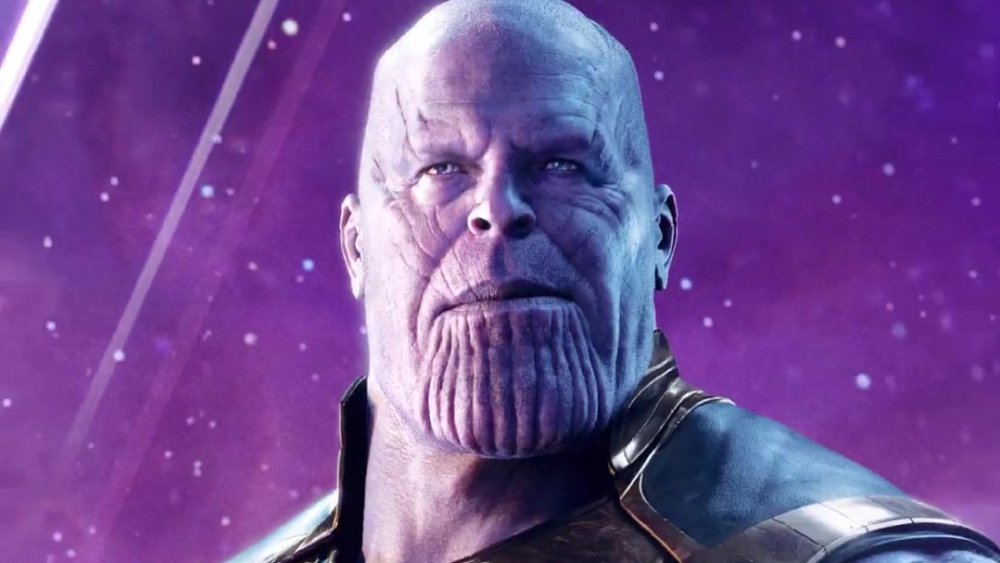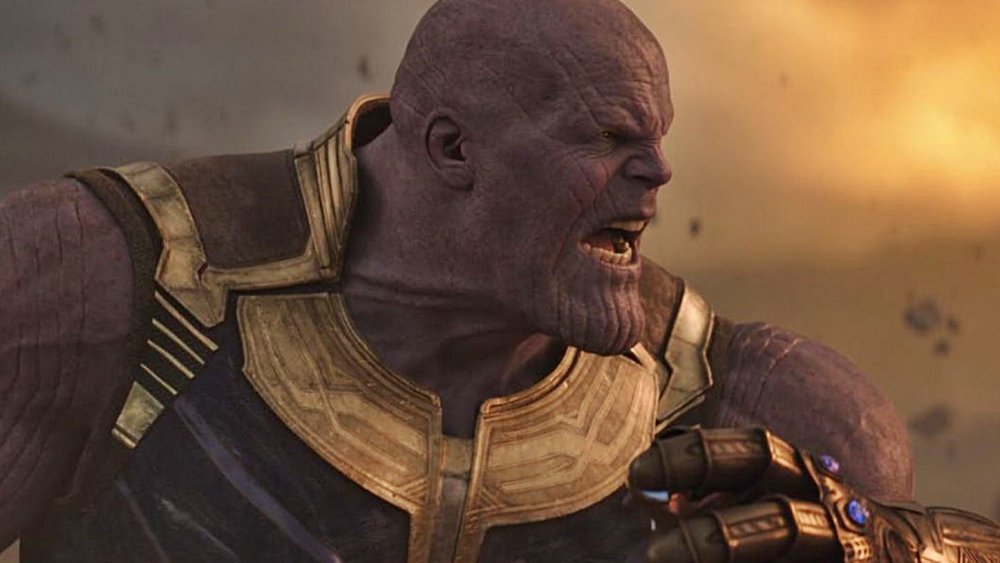Marvel Confirms Thanos Had Two Different Names
The Mad Titan apparently contains multitudes.
In the just-released book The Art of Avengers: Endgame, Wesley Burt — a concept artist on that film as well as Avengers: Infinity War — revealed that the films' art teams referred to the versions of Thanos (Josh Brolin) seen in each movie by different names. (via ScreenRant)
A brief refresher: in Infinity War, Thanos finally completed his long quest to collect all six Infinity Stones, although not without a fight. The Mind Stone, the final piece of his Infinity Gauntlet, lay snug in the forehead of the Vision — and while Shuri and the best and brightest Wakandan scientific minds were busy attempting to extract it without harming or killing the android, the Avengers mounted a ferocious final stand alongside the entire Wakandan army to prevent Thanos and his forces from reaching it.
They failed, and even a final desperate act by Wanda Maximoff (who used her power to destroy the stone, killing Vision in the process) wasn't enough to head off the inevitable. Thanos simply used the Time Stone to rewind time to just before the event, and plucked the Mind Stone from Vision's head (killing him again). Finally in possession of all six stones, Thanos took advantage of Thor's failure to go for the head, snapping his fingers and wiping half of all life in the universe out of existence.
This is the Thanos we were introduced to at the beginning of Avengers: Endgame. Alone on his farm planet, he had basically set the stones to self-destruct, reducing them to atoms before the Avengers and Captain Marvel could catch up to him. Already near death, he offered no resistance as Thor rectified his earlier failure by taking his Stormbreaker battle axe to the Mad Titan, decapitating him.
Later in Endgame, though, we made the acquaintance of a different Thanos — an earlier version who became aware of the Avengers' time-traveling attempts to collect all of the stones before he could, by way of the telltale presence of another version of his daughter Nebula. Realizing that the Avengers' incursion into the earlier time period meant that he would eventually be successful in his quest, Thanos jumped forward in time nearly a decade with a formidable Chitauri army in tow, intent on wiping out the heroes before they could reverse his genocidal action.
According to Burt, these two versions of Thanos understandably had very different mindsets, and therefore, different characterizations — and the art team needed a way to easily tell them apart, leading them to come up with two distinct descriptors. "[The Endgame version of Thanos] was always referred to as Warrior Thanos, as opposed to the Philosopher Thanos that would be in Infinity War," the artist explained.
What's the difference between the two versions of Thanos?
This makes perfect sense, as in Avengers: Infinity War, Thanos always approached his mission philosophically. In his mind, his quest to wipe out billions upon billions of sentient life forms carried with it no malice; to the contrary, he was attempting to correct what he saw as an imbalance, as he believed that endless proliferation of life throughout the universe would eventually lead to a dearth of resources, which in turn would lead to untold death and suffering.
Sure, he would have to extinguish lives on a scale never before conceived of to accomplish his goal — but again, in his estimation, it was necessary so that the universe would head off eventual disaster. It was also apparent that he wished nobody any pain, as after his fateful snap, those destined to vanish simply... crumbled to dust, with no real suffering apparent (Peter Parker's heartbreaking exit notwithstanding).
Contrast this with the younger Endgame version of Thanos, who knew beyond a shadow of a doubt that his mission would succeed. This is the Thanos we met in 2014's Guardians of the Galaxy — the one who told Ronan the Accuser that he would "bathe the starways in [his] blood" if Ronan failed to bring him the Power Stone, the one still in the middle of bloody conflict and conquest. He would see the Avengers' incursion into his timeline as the ultimate affront; he succeeded, and they failed, and they simply couldn't accept that failure, a viewpoint which he explicitly spells out for them during the course of the film.
This version of Thanos believed, per his last words, that he was inevitable — and as such, he was willing to do absolutely whatever it took to ensure that Earth's Mightiest Heroes didn't succeed in their meddling. Fortunately, as we all know, the Avengers were likewise willing to do whatever it took to restore the dusted, and end Thanos' threat once and for all — and the greatest of them, Iron Man, laid down his life to make sure that happened.
Speaking of ol' Shellhead, we've always found it fascinating that Warrior Thanos' ultimate failure is brilliantly foreshadowed by one line spoken by Philosopher Thanos to Tony Stark during the battle on Titan in Avengers: Infinity War. "I hope they remember you," Thanos told Stark — and he certainly got his wish, though not for the reason he'd hoped.

